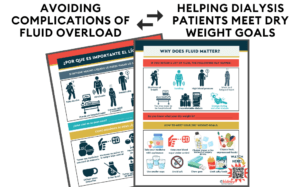Fluid management in dialysis is about avoiding complications and improving health.
As you know, there are several components to the end-stage renal diet. Patients can oftentimes feel very overwhelmed by the number of "restrictions" place on them, especially on top of the added stress of dialysis. Paying close attention to the amounts and types of fluids consumed is just as important as managing nutritional levels of potassium or phosphorus. There's a lot to consider when we are trying to help dialysis patients feel their best.
Keeping recommendations for the renal dialysis diet simple and clear can help ease your patient's overwhelm. That why we create these clear and effective resources for dialysis dietitians and dialysis patients. This handout details the symptoms and risks of fluid overload and provide specific and unique ideas for managing fluid intake and quenching thirst.

Everyone needs to learn how to manage fluids in dialysis: Spanish-translated and QR Video Coded resources
This fluid-focused dialysis handout is perfect for any and all renal patients, highlighting exactly why fluids matter so much in dialysis! You can download this resource in English or Spanish, and make sure you point out the QR video code to your patients. When they scan this code with their smart phone, a video will play that re-teaches these principles of fluid management in dialysis. Your renal patients will retain so much more information this way!
Here's what your patients will learn:
What happens when you drink too much fluid:
- shortness of breath
- cramping
- tired heart
- swelling
- uncomfortable dialysis treatments
- elevated blood pressures
How to reduce fluid gains:
- reduce consumption of sugary beverages
- choose water or ice chips to manage thirst
- avoid salt
- limit fast foods
- chew gum
- use smaller cups
- control blood sugars
- and choose fresh foods
In addition to all of the above listed tips, there is also a space specifically for the patient's individual dry weight! This is a number that your patients need to know and keep track of daily at home to monitor for early signs of fluid overload.
More resources for dialysis patients and dialysis dietitians in the Renal Education Library.
Looking for more resources to teach your renal patients about nutrition and dialysis? Sound like you'd enjoy membership to the Renal Education Library! This is where we keep all of the beautiful, clear resources that dietitians and nephrologists love. Becoming a member is simple and really affordable, especially since many employers will cover the cost for you.
